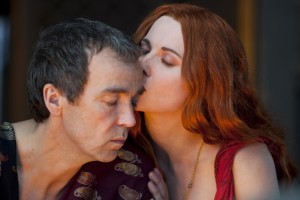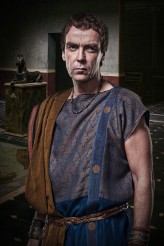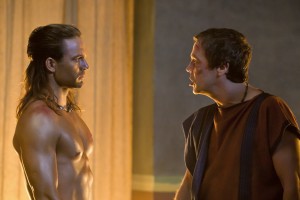In the last episode of Starz’s SPARTACUS: BLOOD AND SAND, Spartacus, played by Andy Whitfield, set the stage for revolt by putting a blade through the throat of gladiator owner Batiatus, played by John Hannah.
Hannah, whose credits include the MUMMY films and FOUR WEDDINGS AND A FUNERAL, understandably thought that his SPARTACUS job was over, but then Whitfield was diagnosed with non-Hodgkin’s lymphoma. Hoping Whitfield would be able to return to work after a year, the SPARTACUS producers decided that instead of doing a conventional second season, they would instead to a prequel, SPARTACUS: GODS OF THE ARENA, showing how Batiatus and his wife Lucretia (Lucy Lawless) rose to the positions they occupied in SPARTACUS: BLOOD AND SAND, which also features Dustin Clare as Gannicus, top gladiator of the day.
Whitfield’s need for additional treatment, and his blessing for the series to continue without him, resulted in the producers recasting his role with Liam McIntyre for the second season proper. Hannah talks about both joining the series originally and his unexpected return to explore Batiatus’ beginnings in GODS OF THE ARENA.

John Hannah and Lucy Lawless in SPARTACUS: BLOOD AND SAND - Season 1 - "Sacramentum Gladiatorum" | ©2011 Starz
ASSIGNMENT X: How much of your attraction to the original SPARTACUS: BLOOD AND SAND was the series itself, and how much was your particular character, Batiatus?
JOHN HANNAH: It was more the project at first, to be honest. I think I’d seen the first script for the first episode only, because obviously, they were still working on it, so I didn’t really know where the character was going, and that became a great surprise and I thought the basis was in that script, like you do in real life – you don’t know what’s going to be happening the week after next, you have plans, aim toward something, and then something happens and you have to deal with it, so I dealt with it in that way, but reading that script – there’s no cops, there’s no doctors, it wasn’t procedural, it was about human beings relating to each other, and as an actor, there’s nothing better than that.
AX: Did you have any hesitation about moving from the U.K. to New Zealand for eight-and-a-half months?
HANNAH: New Zealand’s somewhere I’ve always wanted to go. It’s one of those places that’s on the list. Eight and a half months seemed like a long time, but at the time, the kids were in school, they came out at Easter, they came out for the summer – it seemed like it would be possible. You’ve got to go and work somewhere, so that wasn’t really a consideration.
AX: When you ended SPARTACUS Season One, at the time, did you feel like you were ending it pretty definitively at the time, what with your character getting virtually decapitated?
HANNAH: Yeah. I mean, everybody had sort of felt that was the right thing to do and I didn’t realize what a sort of coup that was in terms of television history, to kill off one of those lead characters, and it felt like it was done. Funnily enough, when I was here [at the Television Critics Association press tour] a year ago, [executive producers] Rob Tapert and Steve DeKnight had ideas for a couple of flashback sequences in order to fill in some more of the information, and they asked if I’d be interested in coming back to do that and I said, “Yeah, absolutely, of course.” And then of course with the direction that things went in, post Andy’s diagnosis, those flashbacks became this arc [of GODS OF THE ARENA]. So I’m really excited to come back and difficult for all sorts of reasons, and also difficult under the circumstances, knowing a fellow actor, who was on the edge of potentially great things, is having to go off and deal with something else. I think the writers have done a fantastic job.
AX: It seems like even if Andy Whitfield can act again, the specific demands of playing Spartacus are not something someone should try to do while they are recovering from a serious illness, because it would just be too much physically …
HANNAH: Yeah, it completely is very, very physically challenging. Even Dustin [Clare], after four, five, six episodes was – you know, aching back and injections. It’s very tiring.
AX: As far as just what you’re doing in the work, did doing the MUMMY films prepare you for working with this kind of heavy CGI?
HANNAH: For sure, in the sense that you deal essentially with what you have in front of you, the person that’s in front of you and the words that you’re saying to each other, and everything else is somebody else’s job.
AX: So you’ve essentially trained yourself to not need real physical scenery around you?
HANNAH: Yeah. You know, whether you’re standing on stage being Hamlet, pretending you can see your father [as a ghost] and that you can’t see the audience, or whether you’re standing in the middle of a green balloon, pretending you’re an ancient Roman, it’s the same thing – an imaginative leap that you make internally.
AX: Quite early on in GODS OF THE ARENA, Batiatus gets the crap beaten out of him and he is pretty bruised for awhile there …
HANNAH: Yeah, that happens right at the beginning. I did spend quite a lot of time before we started wondering is a person bad in their nature or do they become bad because of what they do, without ever really answering it. When I started reading this script, I believe that what you do is what an actor always does and tries to bring that moment to reality. In the first episodes, yeah, there’s a bit of friction with local gangsters, if you like, and I do get a beating, and there’s a moment where there’s that fight or flight instinct. You can either retreat from that, or confront it head-on. What Batiatus does, or what the writers have got him doing, is confronting it, and that is ultimately the kind of person that he is, so again, you have an action that is illustrative of character and yet moves the story on, which I think is just great writing.
AX: Did the beaten-up makeup help with making Batiatus look five years younger for the prequel season?
HANNAH: [laughs] Yeah. Everybody wants to bring something true to the show and every department is outstanding and makeup, not only the obvious prosthetics and the creativity of that, but simply how do we do something that’s subtle but gives a sense of being younger
AX: How would you describe Batiatus? Is he essentially an ambitious businessman of his time?
HANNAH: Yeah, exactly that. He’s ambitious, he wants to get on, the fact that he works in that industry is neither here nor there to him. The concept of Romans being Romans and everyone else being fodder is exactly how they thought, so there was no sense of immorality [in Batiatus’ mind about enslaving others] that we would impose on those characters. He was simply an ambitious businessman who wants to get on and get ahead, so he’d do whatever he had to do to do it.
As a Lineista, a man who runs and owns the gladiators and the gladiators’ school, he’s very hands-on with the slaves in a physical way and also in doling out violence domestically, the way that somebody might kick their nanny or something. I’m on the receiving end of political violence and maneuverings in the operation of what we would call society. There are people there, people in the scripts, who would happily see me, see my character die and be cut to bits. It’s a dog eat dog world, as it still is [laughs].
He’s quite visceral, not necessarily hands-on physical. I suppose early on, I get beaten up and things like that and then I think the main turning point is how you respond to that and whether you fight or flight. He doesn’t run away, he confronts it and deals with it in a very sort of machismo kind of way, and that’s essentially the sort of character that he is. I think the beating in some ways is a catharsis, because as I say, there’s two choices how the character could react to that. And given that he reacts to meet those challenges head on and deal with them, rather than be cowed by them, is essentially an illustration of the kind of character that he is. Everything else is this same response, but simply exaggerated each time, like a drug addict needing a bigger hit – his ambition goes ahead of him and he has to do more dangerous things in order to achieve that.
AX: So he’s not, for example, like a contemporary drug dealer, where he’s aware that somebody might not like what he’s doing, even if he’s okay with it?
HANNAH: We deal with a very brutal world, in every sense. And still with our politics, we deal in a very brutal sense. There’s a question about the violence against the individual, but there’s also the violence against all kinds of societies that we still deal with. For instance, [in the modern Western world], where all kinds of deals are being done in well-carpeted and nicely-furnished offices, where people are going to end up going into the desert and dying. And that’s violence.
AX: Some years ago, you were in the U.S. doing publicity for THE MUMMY RETURNS and you were talking at that time about how you couldn’t believe that George W. Bush had been elected …
HANNAH: That’s exactly how I felt with this. [Batiatus] is immoral in what he’s trying to achieve from our sense, or from my sense of what’s right and wrong. In that sense, he’s the Bushes and the Wolfowitzes of the day, you know? They’re lining their own nest and getting what they can from it. And that’s what my character did. I felt it was very contemporary. And it’s slavery, actually. There’s probably more slavery in the world now than there was in Roman days, actually. We call it slavery, whether it’s people in chains or people who don’t have access to education or clean water or housing.
AX: When SPARTACUS series creator Steven S. DeKnight compared being a gladiator to working for a corporation, I thought, “I don’t think you’re speaking well of slavery, I think you’re speaking badly of working for a corporation.”
HANNAH: Yeah, and I think it’s true of people in jobs who can’t get out of it, they can’t do anything else. There are people standing on street corners waiting to be picked up for twenty dollars a day to do things so they can feed their families. If that’s not a type of slavery, then what is?
AX: What is your take on the current state of affairs in the U.S. and in the U.K.?
HANNAH: Well, the reaction we have to the crisis that the world’s in because of banks is shocking and bewilderingly. Interestingly, Batiatus it seems to me is again a very kind of prototype of your businessman, who still exists today, whether he be in second-hand cars or the oil industry, who has the same ambition – you know, he becomes a successful businessman and then he wants to become the governor and then he wants to become a senator and then he wants to become the president. And that’s how people get into politics and that’s exactly the journey that Batiatus was on.
We see these guys doing business and they’re in suits and all of that, and we tend to think of Batiatus as being a brutal beast, but he’s no different from the Rumsfelds and everybody else who was making money out of that war where young boys were being sent off to their death. We might not see them in a public arena, but with the Internet and embedded journalism and all of that, we do get to see it, and maybe that’s no different from putting men into the arena and watching their deaths. There is still some weird, terrible, beastly fascination we have with killing people. A lot of people are making money out of it, a lot of people in the government are making money out of that still.
AX: Have you worked on any other projects that we should be looking for?
HANNAH: I did a thing in the start of last year, a three-part series with an actor called Trevor Eve, called KIDNAP AND RANSOM, about a ransom negotiator, which again is very current and in the climate with Somali pirates, whether it’s individuals like a British couple, or whether it’s oil tankers. I’m one of the bad guys [laughs]. I think I’ve got to that age where my ruthless ambition is going ahead of me.
AX: Wait, you’re playing a Somali pirate? That seems like a bit of an acting stretch …
HANNAH: No, a South African mercenary.
AX: Okay, somewhat less of a stretch. Do you know what you’re doing next?
HANNAH: No, I’ll be out and looking for a new job. I think I am actually definitively dead in [SPARTACUS], so I’ll have to start taking a new job.
AX: Anything else you’d like to say about SPARTACUS?
HANNAH: I just think it is something that is very unlike anything else people have seen on television and it’s more than that as well. These are great scripts – Steven did a fantastic job with the scripts. It’s not about the big bangs, it’s about everything else that’s going on. I think it’s a very contemporary political show as well. People might have a little bit of cynicism about why there’s a prequel and is it going to be able to live up to some of the expectations from the first series and to be honest, I think it surpasses it, because as Steven has said, not only do we have a fan base and a following who understand this show, but the writers understand how it works and they cut to the chase immediately. I think it’s a really good show.
CLICK HERE for Part 1 of ASSIGNMENT X’s exclusive interview with GODS OF THE ARENA creator Steven S. DeKnight
CLICK HERE for Part 2 of ASSIGNMENT X’s exclusive interview with SPARTACUS creator Steven S. DeKnight
CLICK HERE for Part 3 of ASSIGNMENT X’s exclusive interview with SPARTACUS creator Steven S. DeKnight as he talks about what Season Two of the series will be
CLICK HERE for ASSIGNMENT X’s exclusive interview with GODS OF THE ARENA star LUCY LAWLESS
CLICK HERE for ASSIGNMENT X’s reviews of SPARTACUS: GODS OF THE ARENA and more news
Related Posts:












